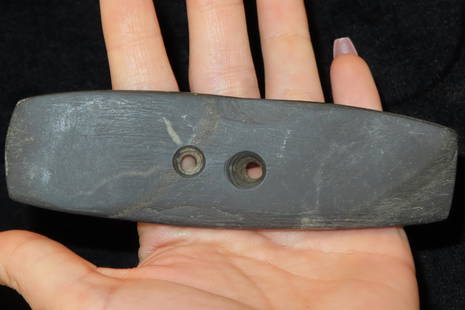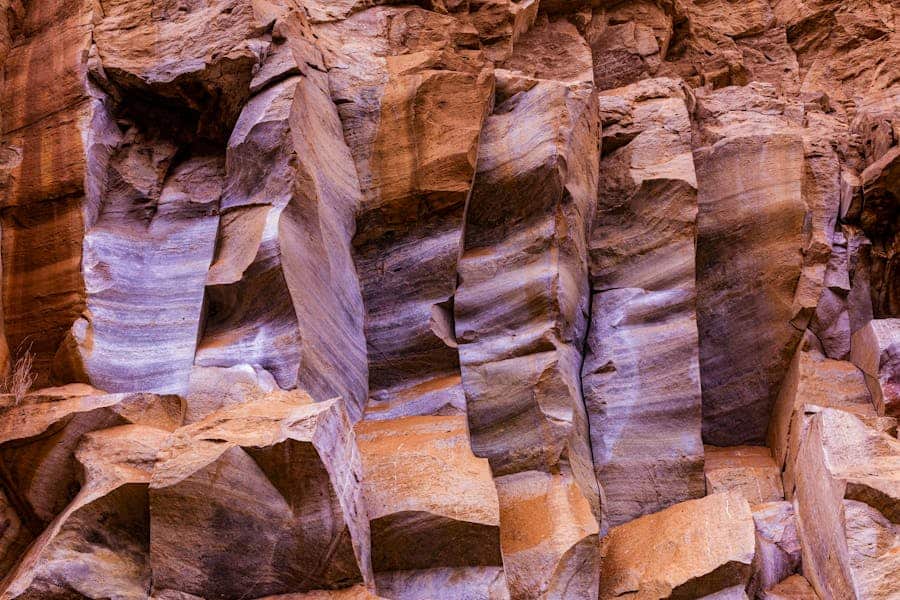Slate is found in Michigan, particularly in Baraga County. The slate in this region is of high quality.
Michigan, known for its diverse geological formations, is home to various valuable minerals. Among these, slate is a prominent resource found in Baraga County, Michigan. The slate quarries in this area, such as those in Huron Bay and Northeast Branch, boast high-quality slate deposits comparable to those found in other regions.
Slate, a hard and brittle rock, contains minerals like mica, chlorite, and quartz. This metamorphic rock is smooth to the touch and prized for its durability and aesthetic appeal. The slate industry in Michigan has a rich history, with active quarries once contributing significantly to the state’s economy.

Credit: www.liveauctioneers.com
Slate Deposits In Michigan
Michigan is home to significant slate deposits that have attracted attention for their quality and abundance. The state boasts various locations where slate can be found, offering unique characteristics that make Michigan slate highly sought after.
Location Of Slate Deposits
In Michigan, slate deposits are primarily concentrated in regions such as Baraga County and Huron Bay along Lake Superior. The quarries in these areas have been recognized for producing slate of exceptional quality, comparable to that found in other parts of the country.
Characteristics Of Michigan Slate
Michigan slate is known for its hardness and brittleness, giving it durability while maintaining a smooth texture. The main minerals found in Michigan slate include mica, chlorite, and quartz, which contribute to its unique appearance and properties.
When it comes to quality and extent of deposits, Michigan slate stands out as a valuable resource, with experts acknowledging its significance in the slate industry. The rich mineral composition and geological formations in Michigan contribute to the high quality of slate found in the state.
Discovering Slate Deposits
Slate, a fine-grained metamorphic rock, has been an important natural resource in Michigan. The discovery of slate deposits in Michigan has a rich history, and the state is home to several prominent slate quarries. Let’s delve into the history of slate discovery and explore the significant slate quarries in Michigan.
History Of Slate Discovery
The exploration for slate in Michigan dates back to the 19th century when the state’s geological formations piqued the interest of prospectors. The discovery of high-quality slate in Michigan led to the establishment of numerous quarries, contributing to the state’s reputation as a significant slate-producing region.
Prominent Slate Quarries
Michigan boasts several prominent slate quarries, with each contributing to the state’s slate industry. The quarries, such as the Huron Bay Slate Quarries and Northeast Branch Slate Quarry in Baraga County, have been pivotal in the extraction and processing of slate for various applications.
Furthermore, these quarries have played a crucial role in showcasing Michigan’s slate as a sought-after material due to its quality and unique characteristics.
Mining And Utilization
Slate can be found in Michigan, particularly in the Baraga County area. The quarries at Huron Bay are known to have high-quality slate deposits that are equal to those found in other regions of the country. The main minerals found in slate are mica, chlorite, and quartz.
Mining Process
Slate mining in Michigan involves the extraction of this unique rock from quarries. The process begins with the identification of suitable locations with abundant slate deposits. Once identified, the quarrying process commences, involving the use of specialized equipment to extract the slate from the earth.
After extraction, the slate undergoes a meticulous process of cutting and shaping to produce slate products of various dimensions. This process requires skilled workers who understand the natural grain and cleavage properties of slate, ensuring that the final products maintain their structural integrity.
Industrial And Artistic Applications
Slate from Michigan finds diverse applications in both industrial and artistic fields. In the industrial sector, slate is utilized for roofing tiles, flooring, and as a material for pool tables due to its durability and resistance to moisture. The unique color variations and smooth texture of slate also make it a popular choice for decorative purposes in residential and commercial construction.
Artistically, slate is a favored material for creating intricate carvings, sculptures, and ornamental pieces. The natural beauty and fine-grained structure of slate make it an ideal medium for artists to express their creativity, resulting in exquisite works of art that showcase the unique characteristics of this Michigan resource.
Economic And Geological Significance
Slate in Michigan holds significant economic and geological value due to its abundance and unique properties.
Value Of Slate Deposits
The value of slate deposits in Michigan lies in its diverse applications, ranging from roofing materials to decorative items.
Geological Composition
The geological composition of Michigan slate comprises minerals like mica, chlorite, and quartz, contributing to its distinctive characteristics.
Slate’s hard and brittle nature makes it ideal for various construction purposes while offering a visually appealing aesthetic.
- Slate is smooth to the touch despite its hardness, making it a versatile material for different projects.
- The presence of minerals like mica and quartz gives slate its unique appearance and durability.
The quality and extent of slate deposits in Michigan, particularly in areas like Huron Bay, are highly regarded within the industry.
| Location | Significance |
|---|---|
| Huron Bay, Lake Superior, Michigan | High-quality slate deposits comparable to eastern regions |
| Arvon, Baraga County, Michigan | Presence of Northeast Branch Slate Quarry |
The mining of slate in Michigan, particularly in regions like Baraga County, has contributed to the state’s economy and industrial growth.
Overall, the economic and geological significance of slate in Michigan underscores its importance as a valuable natural resource.
Preservation Efforts
Michigan’s slate industry has a long history, and efforts to preserve the natural beauty of slate quarries and ensure sustainable mining practices are crucial. Conservation initiatives and sustainable mining practices play a vital role in preserving the unique geological formations and protecting the environment for future generations.
Conservation Initiatives
Conservation efforts in Michigan focus on preserving the natural landscape and maintaining the ecological balance in slate mining areas. This includes reclamation projects to restore mined areas to their natural state, protecting wildlife habitats, and minimizing the environmental impact of mining activities.
Sustainable Slate Mining Practices
Sustainable mining practices in Michigan involve employing advanced technologies to reduce the environmental footprint of slate extraction. These practices include minimizing water usage, implementing effective waste management systems, and promoting the use of renewable energy sources to power mining operations. Additionally, strict adherence to regulations ensures the sustainable extraction and processing of slate while preserving the natural environment.
Future Prospects
Michigan has been a significant source of slate, offering potential for future growth in the industry. With advancing technological innovations and evolving market trends, the state’s slate reserves hold promising opportunities for development and expansion.
Technological Innovations
The emergence of advanced mining technologies has the potential to optimize the extraction and processing of slate in Michigan. Innovations such as automated mining equipment, drone-assisted surveys, and 3D modeling for geological assessments are revolutionizing the slate mining industry. These technological advancements enhance efficiency, safety, and accuracy in the exploration and extraction of slate, contributing to the sustainable growth of the sector.
Market Trends
The market trends for slate in Michigan are influenced by factors such as sustainable construction practices, eco-friendly building materials, and the growing demand for aesthetically appealing and durable roofing materials. With an increasing emphasis on environmentally conscious construction, the demand for slate as a sustainable and long-lasting roofing material is expected to rise. Additionally, the integration of slate into interior design and landscaping applications further expands its market potential, presenting lucrative opportunities for the state’s slate industry.
Frequently Asked Questions
Where Can Slate Rock Be Found?
Slate rock can be found in locations like Michigan, specifically in areas such as Austin, Texas, and the Upper Peninsula.
What Is The Most Valuable Mineral In Michigan?
The most valuable mineral in Michigan is copper, with associated gem minerals found in the region.
What Minerals Are In The Upper Peninsula Of Michigan?
The Upper Peninsula of Michigan contains minerals like native copper, native silver, quartz, prehnite, pumpellyite, zeolites, calcite, and datolite.
Is Slate Hard Or Soft?
Slate is a hard rock with a smooth texture, containing minerals like mica, chlorite, and quartz.
Where Can Slate Rock Be Found In Michigan?
Slate rock can be found in Michigan’s Upper Peninsula, particularly in Baraga County.
What Is The Most Valuable Mineral In Michigan?
Copper is the most economically valuable mineral in Michigan, with associated gem minerals.
Conclusion
Michigan is home to high-quality slate deposits, particularly in areas like Baraga County and the Upper Peninsula. The slate is valued for its strength and durability, making it a sought-after material for various construction and decorative purposes. With its unique mineral composition and geological formations, Michigan’s slate continues to be a significant resource for the state’s economy and heritage.










Leave a Reply